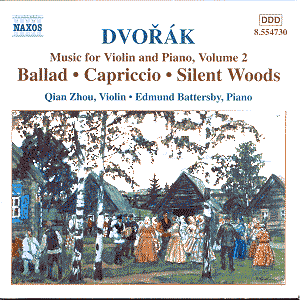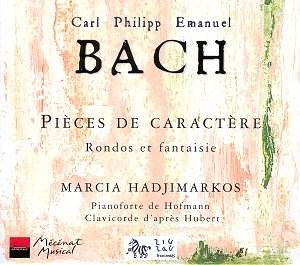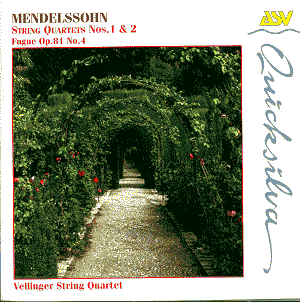 Composer: Antonín Dvořák (1841-1904)
Composer: Antonín Dvořák (1841-1904)
Works: Music for Violin and Piano Volume 2: Ballad in D Minor Op. 15 No. 1; Slavonic Dance in G Minor Op. 46 No. 2 (arr. Kreisler); Slavonic Dance in E Minor Op. 72 No. 10 (arr. Kreisler); Slavonic Dance in G Major Op. 72 No. 16 (arr. Kreisler); Silent Woods Op. 68 No. 5; Mazurek in E Minor Op. 49; Nocturne in B Major Op. 40; Humoresque Op. 101 No. 7; Songs My Mother Taught Me Op. 55 No. 4 (arr. Kreisler); Capriccio (Rondo di Concerto) B81; Reverie Op. 85 No. 6 (arr. Klengel)
Performers: Qian Zhou (violin), Edmund Battersby (piano)
Recording: Potton Hall, Suffolk, May 1999
Label: NAXOS 8.554730 [54:58]
Dvořák’s chamber works for violin and piano, particularly those featured in this second volume of the Naxos series, offer a rich tapestry of Czech folk influences interwoven with the composer’s unique voice. This collection, while including a number of well-trodden favorites, also ventures into more obscure territory, presenting a program that may at times feel eclectic but ultimately showcases the versatility and emotional depth of Dvořák’s oeuvre. The juxtaposition of the more familiar Slavonic dances with lesser-known pieces such as the Capriccio allows listeners to appreciate both the composer’s popular appeal and his more introspective, lyrical tendencies.
Qian Zhou and Edmund Battersby deliver performances that are both technically solid and emotionally engaging. Zhou’s command of expressive devices is particularly noteworthy; her veiled tone in the Ballad in D Minor evokes a poignant depth, mirroring the work’s introspective character. Battersby complements her playing with a nuanced dynamic range, particularly evident in the G Minor Slavonic Dance, where his careful control of articulation enhances the work’s buoyant spirit. However, the performance of the G Major dance, while vibrant, suffers slightly from a pizzicato ending that lacks the wit one might expect from such a lively piece.
The Silent Woods, originally a piano duet, emerges here with a delicate lyricism, expertly rendered by both musicians. Though the arrangement cannot quite replicate the cello’s sonorous depth, Zhou and Battersby navigate its emotional landscape with sensitivity. In contrast, the Nocturne, an earlier work, presents a challenge; despite their best efforts, its meandering structure results in a performance that feels diffuse and lacks the focused clarity necessary to bring its melodic contours to life.
The Humoresque showcases Zhou’s ability to engage fully with the music, her playing infused with vigor, though the tonal allure occasionally wavers. Similarly, the Kreisler arrangement of Songs My Mother Taught Me is delivered with passionate intensity, though some listeners may find Zhou’s interpretation a touch excessive. The Capriccio, a youthful work by Dvořák, provides an interesting study in contrasts; it is marked by a distinctly Germanic influence yet brimming with Romantic flair. The performance is commendably convincing, even as the piece itself teeters on the edge of self-indulgence, revealing both its youthful exuberance and its somewhat unfocused ambition.
The recording quality is commendable, capturing the interplay between violin and piano in a resonant acoustic that enhances the ensemble’s interplay. This disc is an engaging listen, even if it presents an uneven program; the committed performances by Zhou and Battersby breathe life into each piece.
This collection, while perhaps lacking the cohesiveness of a thematically unified recital, ultimately provides a compelling exploration of Dvořák’s chamber music. The performances are imbued with a sense of commitment and interpretative depth that invites repeated listening, making it a worthwhile addition to the discography of one of the great composers of the 19th century.



